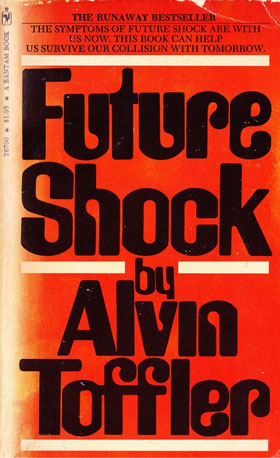
Alvin Toffler, the US author whose visions of accelerating social change guided Chinese leaders, American politicians and business moguls through the best-selling books Future Shock and The Third Wave, has died. He was 87.
He died on 27 June at his home in Los Angeles, according to a statement from Toffler Associates, the US-based consulting firm he co-founded with his wife, Heidi Toffler. No cause was given.
Toffler wrote more than a dozen books charting the cultural shift from manufacturing-based economies to those driven by knowledge and data in the 20th century. Working with his wife, Toffler predicted the unfolding of what he coined “the Information Age” and became a guru of sorts to world statesmen.
“Nobody knows the future with certainty,” he said in an interview with China’s People’s Daily newspaper in 2006. “We can, however, identify ongoing patterns of change.”
China’s Zhao Ziyang, Singapore’s Lee Kuan Yew and Korea’s Kim Dae Jung tapped his views as Asia’s emerging markets increased in global significance during the 1980s and 1990s.
In 1994, US house speaker Newt Gingrich urged members of congress to read Toffler’s latest book, Creating a New Civilization. Toffler’s works also influenced Mexican billionaire Carlos Slim, who became the world’s richest person and a friend of the writer’s, according to a 2007 article in the Wall Street Journal. More than 15m copies of Future Shock have been sold, according to the Tofflers’ website.
Toffler’s impact may be most evident in China. In 2006, the Communist Party named him to a list of 50 foreigners who significantly influenced the country in recent centuries. The Third Wave, published in 1980, was a bestseller in China, and a video version, produced by Heidi Toffler, was distributed to schools nationwide. The couple said both were pirated, so they didn’t earn any royalties.
“Where an earlier generation of Chinese, Korean, and Vietnamese revolutionaries wanted to re-enact the Paris Commune as imagined by Karl Marx, their post-revolutionary successors now want to re-enact Silicon Valley as imagined by Alvin Toffler,” Alexander Woodside wrote in a 1998 essay in Daedalus, a journal published by the American Academy of Arts & Sciences.
 Three waves
Three waves
Future Shock, published in 1970, described society’s development as a series of waves, from the agricultural revolution of the Neolithic Age to industrialisation in the 18th century to the Information Age since the 1950s. After The Third Wave, Powershift in 1991 completed the trilogy, examining how knowledge became the main means of gaining power and wealth, presenting challenges for the nation state and opportunities for corporations. Toffler forecast that humans would be overwhelmed by the pace of change in everything from technology to politics.
The Tofflers claimed on their website to have foretold the breakup of the Soviet Union, the reunification of Germany and the rise of the Asia-Pacific region. He said in the People’s Daily interview that Future Shock envisioned cable television, video recording, virtual reality and smaller US families.
While critics said Toffler was often wrong and failed to foresee humans’ ability to adapt to the pace of change, he said futurist debate is essential to making social progress.
‘What’s possible’
“It makes you think,” he said in a 2010 interview published on the NPR radio network’s website. “It opens up the questions of what’s possible. Not necessarily what will be, but what’s possible.”
Alvin Eugene Toffler was born on 4 October 1928 in New York to Sam and Rose Toffler, immigrants from Poland.
He studied English at New York University, where he met Adelaide Elizabeth Farrell, known as Heidi, who was starting graduate linguistics study. They dropped out and moved in 1950 to Cleveland, where they married and became factory workers. He was a millwright and welder, while she was a union shop steward in an aluminium foundry, according to their website.
“Working in a factory, as my wife and I both did for four or five years, was like a postgraduate education for us,” Toffler said in a 1998 interview with Australian Broadcasting Corp. “It taught us first of all that people working in factories are no less intelligent than people who work in white shirts.”
Labour writer
Toffler then worked for a newspaper backed by the International Typographical Union, followed by a stint as congress and White House correspondent for a Pennsylvania newspaper, the York Gazette and Daily. Returning to New York, Toffler joined Fortune as its labour columnist before writing about business and management for the magazine.
After leaving Fortune in 1961, he wrote a paper on the social and organisational impact of computers for IBM. He advised AT&T that the company would have to break up, more than a decade before the government forced it to, according to the Toffler website.
The couple co-founded a consulting firm, Toffler Associates, in 1996. It helped clients to “survive — and thrive — in an environment of accelerated change by creating agile and adaptive organisations,” according to its website.
In 2006, they published Revolutionary Wealth, examining nonmonetary wealth in a global economy that has blurred the distinctions between producer and consumer, creating what they call a “prosumer”.
“We futurists have a magic button,” Toffler said in a 2006 interview with Strategy & Business magazine. “We follow every statement about a failed forecast with ‘yet’.”
He is survived by his wife of more than 60 years. The couple had a daughter, Karen, who died in 2000. — © 2016 Bloomberg LP
- With reporting assistance from Stephen Miller

